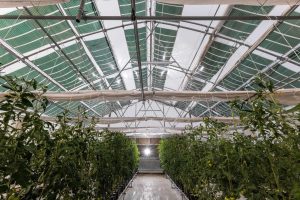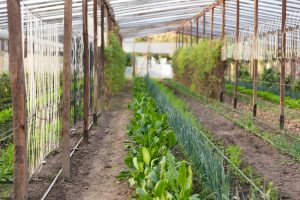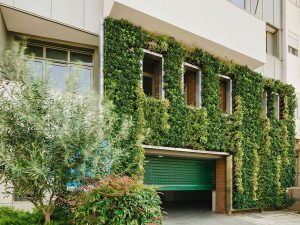By RFF
As cities expand, sustainable food production is essential for food security, environmental resilience, and energy efficiency. Urban and peri-urban farming offer solutions by integrating renewable energy, fostering community engagement, and enhancing green infrastructure. In Greece, several initiatives demonstrate these benefits. These projects highlight the potential of innovative agricultural practices to support local communities and create more sustainable urban environments. Let’s get to know them.
A 100% Energy-Autonomous Greenhouse in Thessaloniki

Located in Thermi, Thessaloniki, an innovative energy-autonomous greenhouse has been developed by a Greek company specialised in nanotechnologies, Organic Electronic Technologies. It is a greenhouse powered entirely by renewable energy sources. This project demonstrates how clean energy can enhance agricultural productivity while reducing environmental impact.
The greenhouse (photo credits: OET) integrates third-generation flexible photovoltaics, developed in Greece, and wind turbines to create a fully autonomous energy system. This approach not only sustains hydroponic tomato production but also improves both yield (by up to 30%) and quality. The experimental project, which started in September 2021 explores various factors such as automation, radiation limitation, and energy source integration to optimise agricultural output. This project highlights the potential of integrating renewable energy solutions into food production systems, setting a precedent for other urban and peri-urban agricultural endeavors.
Community Urban Farms in Athens: Food Security and Social Impact

Urban agriculture is not only about technological innovation—it also serves as a social and economic lifeline for local communities. In Athens, urban agriculture has been used to mitigate food insecurity, particularly among low-income households affected by Greece’s economic crisis.
A notable example is the transformation of a municipality-owned plot in Amourassion, a northern suburb of Athens, into a community vegetable garden (photo credits: freepik). The land was divided into 40 individual parcels of 25 square meters each, providing residents with space to grow their fruits and vegetables. These community farms not only support food self-sufficiency but also improve access to nutritious food for vulnerable populations.
Greece’s First Vertical Garden: A Model for Greener Cities
While urban farms provide food, green infrastructure is crucial in making cities more livable and sustainable. Thessaloniki is home to Greece’s first vertical garden on a public building (photo credits:ologramma-architects), showcasing how urban environments can integrate greenery to improve microclimates and energy efficiency.
 The Urban Environment Directorate building on Kleanthous Street was transformed with a 50-square-meter vertical garden featuring 804 potted plants of four species adapted to the local climate. The project was carried out through a collaboration between the Thessaloniki Municipality, the Global Water Partnership Mediterranean, and the Coca-Cola Greece environmental program. To support sustainability, the vertical garden utilises an advanced rainwater collection and irrigation system. This system optimises water use while reducing the ‘urban heat island’ effect, lowering temperatures and enhancing building energy efficiency. The initiative is part of broader municipal efforts to promote water conservation, including installations at the Toumba municipal swimming pool, which have reduced water and energy consumption by 20-30%.
The Urban Environment Directorate building on Kleanthous Street was transformed with a 50-square-meter vertical garden featuring 804 potted plants of four species adapted to the local climate. The project was carried out through a collaboration between the Thessaloniki Municipality, the Global Water Partnership Mediterranean, and the Coca-Cola Greece environmental program. To support sustainability, the vertical garden utilises an advanced rainwater collection and irrigation system. This system optimises water use while reducing the ‘urban heat island’ effect, lowering temperatures and enhancing building energy efficiency. The initiative is part of broader municipal efforts to promote water conservation, including installations at the Toumba municipal swimming pool, which have reduced water and energy consumption by 20-30%.
Sources:
